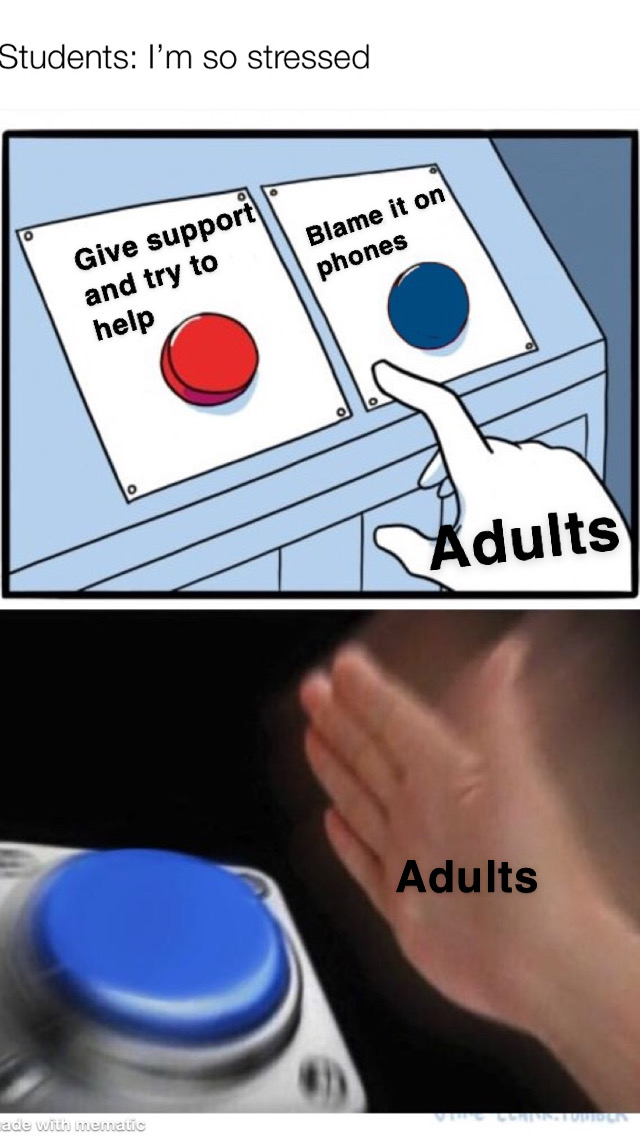Norah Ludke and Abigail Ernst
According to the American Psychological Association (ASA) report from 2014, teens found during the school year their stress is higher than necessary. The ASA measures stress on a 10 point scale, with teen’s current stress levels at a high 5.8. The regular level of stress is 3.8.
It has been reported from the same study that teens are more stressed than adults. The average adult stress level is high, placing a 5.1 on the scale. However, teen stress levels continue to soar.
T.C. School Counselor Dee Marrara believes that stress is an important issue at school. She said, “Phones bring on more stress because of social media [causing students to] lose the ability to talk [to people].”
Many adults believe that phones bring more stress than school or other factors, but from a student’s perspective, that is not true. Teenagers are more stressed by school, friends, and parents. Additionally, the college application process creates a lot of anxiety for juniors and seniors.
The application process has become increasingly competitive, with everyone competing for a spot at their choice of school. Students want their application to stand out, so they sacrifice sleep, personal time, and a healthy diet. Many take many extracurriculars which can increase stress and anxiety levels because of the amount of work that is needed to complete.
TC Williams is partnering with the PTSA (Parent Teacher Student Association), PTAC (Parent Teacher Association Council), and the Department of Student Services to combat stress. In order to do this, they are holding a showing for the indie movie Angst on Thursday, Nov 14, from 6-8 pm. This movie addresses anxiety and provides tools and resources for recognizing and managing it.
Stress can have many effects on the body, mind, and behavior. For example, high levels of stress can cause headaches, anxiety, overeating or not eating enough. In many cases, depression can be caused by stress.
Marrara says a way to safely handle this stress is to, “Take a scale back, kids [definitely] overschedule themselves; sleep helps reduce this stress.”
If high levels of stress and anxiety are not addressed, muscles can tense up, leading to chronic pain later in life. Students’ immune systems can be greatly affected by stressful behavior. Many diseases can be developed when the immune system weakened, such as asthma, Chronic Obstructive Pulmonary Disease, and Chronic Bronchitis.
There are many ways to reduce and handle stress. One method is called Emotional Freedom Technique (EFT) Tapping. EFT Tapping is a series of taps to parts of the body. This repetitive tapping sends calming signals to the amygdala, allowing your body and mind to feel safe.
When done right, this method will dissipate anxiety and stress. When using this method, the order of taps does not matter, but you must gently tap the back of your hands, your forehead, your cheeks, your elbows, your chest, your chin, and your shoulders.
Counselor Marrara said, “deep breathing, muscle relaxation, time management, looking at goals, yoga, and meditation” can help students manage their stress levels.
Another method of reducing stress is talking to a trusted adult or friend. T.C Williams has many counseling services and psychologists. Each student is assigned a counselor at the beginning of the year, but the school has a school psychologist named Micheal Nyman. His office is located in the library, in the conference room on the left side.
If you are struggling with stress, anxiety, or depression, make sure that you talk to a trusted adult or friend. During our research period for this article, we noticed that it is increasingly difficult to find a school psychologist. Below is a list of people who are willing to help students with stress.
Your assigned counselor
Mike Nyman – school psychologist (Located in the Library)
School Nurse (Located in the College and Career Center)



